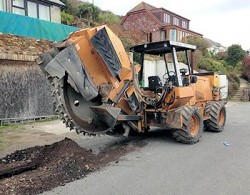MEPs Support “Broadband Ready” Label for Homes and Cheaper Civil Works

Europe’s ITRE Industry Committee yesterday approved a draft law that could help to cut the cost of civil works (e.g. digging up roads to lay new fibre optic cable) when deploying new broadband infrastructure. Members of the European Parliament (MEPs) have also called for a voluntary “broadband-ready” label on new homes.
At present civil works account for the lion’s share of development costs (some say as much as 80%) when rolling out new broadband infrastructure and the Draft Regulation, which was first proposed in March (here), aims to slash that by around 20-30%. It’s worth pointing out that the United Kingdom has already introduced similar legislation under the Growth and Infrastructure Act.
Advertisement
Some of the ways that the new EU regulation might achieve all this is by cutting red tape in the planning process and giving broadband infrastructure developers the right to access “promptly“, via a single information point, at least information on the location, route, size, type and current use, name of owner and a contact point for existing infrastructure (including work that is planned and underway). In theory this might make it harder for BT to protect their detailed speed and coverage (SCT) data, especially if they’re also taking state aid under the Broadband Delivery UK (BDUK) scheme.
On top of that MEPs also want to see all newly-constructed public buildings and public multi-dwelling buildings, including social housing, being equipped with the correct “in-house infrastructure” to support superfast broadband. This would be supported by an EU-wide Broadband-Ready label to be used, on a voluntary basis, for buildings and apartments with access to “high-speed” broadband infrastructure.
MEP Edit Herczog (S&D, HU), Rapporteur, said:
“All our rural development initiatives in the EU will be wasted if we don’t manage to bring high-speed internet to all our towns and villages. Without it, rural Europeans will become second-class citizens without access to jobs, information, services or even to education. Nowadays if you are cut off from the web, you are cut off from society“.
Digging deeper we also note that the Industry Committee has recommended the phasing out of universal service for delivering “basic broadband” connectivity (defined by the ITRE as any speed in excess of 144Kbps) and relying instead on state aid together with measures to support end-users directly. “It should be phased out in favour of more suitable tools, notably including state aid [or vouchers]. Targeted instruments could then be used to address affordability issues that would remain for some users,” said a recent ITRE report.
It’s also interesting to note how, earlier this year, the UK Government suggested that the draft measures “do not comply” with the principle of subsidiarity (here), which determines when the EU is “competent to legislate, and contributes to decisions being taken as closely as possible to the citizen“. In other words the EU may only intervene if it is able to “act more effectively than Member States“, which is relevant to the UK where similar rules already exist.
Advertisement
The UK thus wants the changes to be reduced from Regulation to a Directive and has questioned some of the proposed cost saving assumptions. At the present time we are not aware of this position having changed and the EU regulation still has a few months of debate left before it can be approved.
Mark is a professional technology writer, IT consultant and computer engineer from Dorset (England), he also founded ISPreview in 1999 and enjoys analysing the latest telecoms and broadband developments. Find me on X (Twitter), Mastodon, Facebook, BlueSky, Threads.net and Linkedin.
« Fell End Broadband Project Starts Fibre Optic Rollout in Cumbria UK






















































Comments are closed